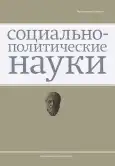Религиозность и поддержание здоровья в представлениях современной студенческой молодежи
- Авторы: Петросян Д.И.1,2, Шадрина О.Н.3
-
Учреждения:
- Владимирский филиал Российской академии народного хозяйства и государственной службы при Президенте РФ
- Владимирский государственный университет имени Александра Григорьевича и Николая Григорьевича Столетовых
- Северный государственный медицинский университет
- Выпуск: Том 12, № 5 (2022)
- Страницы: 85-90
- Раздел: Статьи
- URL: https://journal-vniispk.ru/2223-0092/article/view/147016
- DOI: https://doi.org/10.33693/2223-0092-2022-12-5-85-90
- ID: 147016
Цитировать
Аннотация
Ключевые слова
Полный текст
Открыть статью на сайте журналаОб авторах
Дмитрий Ильич Петросян
Владимирский филиал Российской академии народного хозяйства и государственной службы при Президенте РФ; Владимирский государственный университет имени Александра Григорьевича и Николая Григорьевича Столетовых
Email: ilyich87@yandex.ru
кандидат философских наук, доцент; доцент кафедры социально-гуманитарных дисциплин; доцент кафедры социологии Владимир, Российская Федерация
Ольга Николаевна Шадрина
Северный государственный медицинский университет
Email: shadrina.olga.29@mail.ru
кандидат философских наук; доцент кафедры гуманитарных наук Архангельск, Российская Федерация
Список литературы
- Светличная Т.Г., Смирнова Е.А. Социальные стереотипы использования лекарственных средств трудоспособным населением промышленного города // Экология человека. 2020. № 1. С. 59-64.
- Аринин Е.И., Петросян Д.И. Особенности религиозности студентов // Социологические исследования. 2016. № 6. С. 71-77.
- Фурман Д.Е., Каариайнен К. Религиозность в России в 90-е годы XX - начале XXI века // Доклады Института Европы РАН. № 173. 2006.
- Федеральный закон от 25 июля 2002 г. № 114-ФЗ «О противодействии экстремистской деятельности» (с изменениями и дополнениями) // Собрание законодательства РФ. 2002. № 30. Ст. 3031.
- Основы социальной концепции Русской Православной Церкви. 2000 [Электронный ресурс]. URL: http://www.patriarchia.ru/db/text/419128.html) (дата обращения: 10.09.2022).
- Primiano L.N. Vernacular religion and the search for method in religious folk life // Western Folklor. 1995. No. 1. Pp. 37-56.
- Христофорова О.Б. Опознать беса. Ч. 1. Вернакулярные теории болезней и методы символического лечения // In Umbra: Демонология как семиотическая система: альманах. Вып. 5. М., 2016. С. 259-260.
- Кон Й. Страннические годы Вильгельма Мейстера // Лики культуры: Альманах. Т. 1. М., 1995. С. 211-212.
- Гёте И.В. Из «Анналов» (1811) // Гёте И.В. Избранные философские произведения: пер. с нем. М., 1964. С. 62.
Дополнительные файлы








